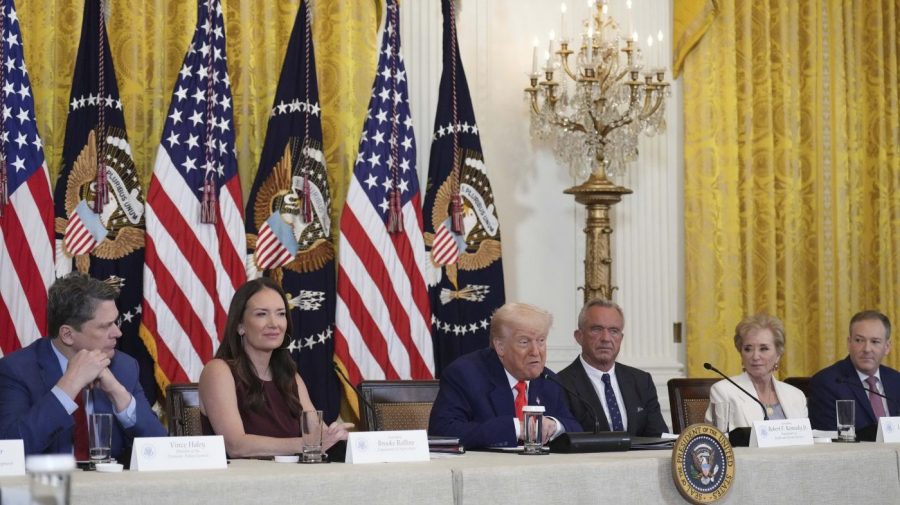The highly anticipated second report by the Make America Healthy Again Commission lays out the Trump’s administration’s planned health strategy around priorities including vaccines, childhood nutrition, water fluoridation and exposure to chemicals.
The report, which tracks with Health Secretary Robert F. Kennedy Jr.’s stated priorities, sets in motion various initiatives but lacks substantial findings or regulatory aims to support its goal of ending childhood chronic disease.
As the first part of the Trump administration’s MAHA strategy, the report announces the creation of the Initiative on Chronic Disease under the National Institutes of Health, which will “leverage and align existing NIH research projects, improve NIH coordination on chronic disease research, and generate actionable results for diseases arising in childhood and adulthood.”
Part of promoting the MAHA agenda will include a “Make American Schools Healthy Again awareness campaign” to provide information on best practices for “increasing physical activity and improving nutrition options.” The campaign will be carried out by the Department of Health and Human Services (HHS), along with the Department of Agriculture, the Department of Education and the President’s Council on Sports, Fitness, and Nutrition.
The report also describes a planned “vaccine framework” to be developed by the White House Domestic Policy Council and HHS. The framework will include ensuring “the best childhood vaccine schedule;” addressing vaccine injuries; “modernizing” American vaccines; ensuring “scientific and medical freedom;” and “correcting conflicts of interest and misaligned incentives.”
It does not say what the framework will be, but the administration has been broadly skeptical of vaccination – to the alarm of many public health experts. Several top leaders at the Centers for Disease Control and Prevention (CDC) resigned or were ousted for, in their words, refusing to get behind Kennedy’s anti-vaccine moves.
To accommodate the strategy, HHS will be restructuring to include the Trump administration’s Administration for a Healthy America, which brings together various existing public health agencies within the federal government.
The long-awaited report appears to sidestep calls for regulations of toxic chemicals, an area of tension among the Republican base as their more typical big business allies favor few regulations, but MAHA activists call for action to address these substances.
It does call for working to “reform the approval process” for chemicals and pesticides, but does not specify what those reforms will be other than to say the goal is to protect against pests and “increase the timely availability of more innovative growing solutions for farmers.”
In language that’s already drawing ire from MAHA-aligned activists, the report describes the Environmental Protection Agency’s (EPA’s) pesticide review procedures as “robust” and says it will work to ensure that “the public has awareness and confidence” in them.
The Trump administration has repeatedly promised to “make America healthy again” but has also pledged to take a deregulatory stance on energy and the environment. The EPA has said it plans to weaken rules on toxic chemicals and other types of pollution and has moved to exempt dozens of polluters from complying with environmental rules.
Regarding water quality, the MAHA report said that the CDC will be updating its recommendations for fluoride and per- and polyfluoroalkyl substances – known as PFAS or “forever chemicals” – in water.
Fluoride is known to have dental health benefits. However, it has come under scrutiny from Kennedy and others as some studies indicate potential impacts to IQ. Other studies have found no impact of fluoride on IQ, and major health organizations have continued to recommend it be added to drinking water.
Many “forever chemicals” have been found to be toxic and have been linked to illnesses including kidney and testicular cancer. The Biden administration issued the first-ever regulations for six types of PFAS in drinking water. The Trump administration said it will retain but delay standards for two PFAS, but is removing and reevaluating standards for the other four.
The first report issued in May argued that children are taking too many medications, such as vaccines and psychiatric drugs.
In a seeming response to that conclusion, the second report stated that HHS will create a “mental health diagnosis and prescription working group” that will evaluate prescription patterns for common psychiatric medications like antidepressants, mood stabilizers and stimulants. It additionally said that the NIH and the Food and Drug Administration will look into repurposing existing drugs for treating chronic disease.
Along with action items, the report also includes several policy reforms that the Trump administration will be putting its support behind. These include updating dietary guidelines, limiting the use of petroleum-based food dyes, reevaluating food additives and increasing breastfeeding rates.

